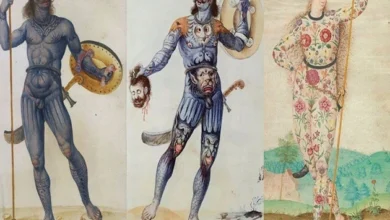Can a Christian celebrate Halloween?

It’s Halloween week! Many are preparing to celebrate this festivity of horrors. Among Christians, even if a good majority continues to affirm that one should not take part in it, others, more and more numerous, take up the defense of this holiday and sometimes make it legitimate.
Is Halloween really a harmless holiday? Can we let our children beg for sweets at the doors? Are we allowed to dress up as monsters and other dark creatures to take part?
The origins of Halloween
Celebrated on October 31, Halloween takes place on All Saints Day. Its name comes from the English All Hallow’s day meaning Toussaintand All Hallow E’en to indicate the day before today. The vast majority of sources present Halloween as a legacy of the pagan holiday of His hand which was celebrated at the beginning of autumn by the Celts. This festival dates back more than 3000 years! Among these peoples, the year did not end on December 31 but on October 31.
This last night of the year was the night of His hand, the god of the dead. According to many Celtic legends, the ghosts of the dead then visited the living. This night was for them the moment when the spiritual world met the natural world. It could take 15 days. The Celts performed very special religious rites. The Druids lit a fire on an altar.
Each head of family received an ember to light a new fire in his home. This fire was supposed to protect homes from evil spirits. During the night, the whole village gathered to the feast. Animals were sacrificed and to scare evil spirits, men dressed in terrifying costumes, for example, wore animal skins, and wore hideous make-up (the famous Halloween costumes). Halloween is therefore originally a pagan festival during which demonic rites were practiced.
And All Saints in all this?
Over the centuries, the Celtic custom of Halloween developed throughout Europe and became part of the celebrations of the Christianized West. In the 8th and 9th centuries, it was with Popes Gregory III and Gregory IV that the Catholic Church decreed that the saints would be celebrated on November 1, which introduced the feast of All Saints.
A large majority of historians consider that this date was chosen to “Christianize” the feast of His hand. This is how Celtic pagan festivities and the feast of the dead introduced by the Catholic Church came together.
Remember that October 31 was also the date chosen by some Protestants to celebrate the Feast of the Reformation, although it is considered a minor feast.
Popularization Halloween
In the 1840s, famine pushed the Irish to immigrate to the United States, taking with them the customs of Halloween. Over the years, Celtic traditions have turned into a celebration for children. They disguised themselves as ghosts and knocked on houses to get candy.
The children carried lanterns made from pumpkins at the end of a stick. The people who opened the door to them gave them gifts for fear that they would curse them, with the famous “trick or treat” (translated “trick or treat”).
Halloween and its symbols
Today, Halloween is associated with the Day of the Dead. Symbols of this holiday usually involve darkness, magic, mythical monsters or ghastly creatures. Characters commonly associated with Halloween are ghosts, witches, vampires, bats, haunted houses, graveyards, black cats, spiders, zombies, mummies, skeletons, werewolves and demons. In the United States, characters inspired by horror or tragic films are honored such as Dracula or Frankenstein.
And the Christians in all this?
When we know how the world celebrates this holiday and the dark symbols attached to it, it seems obvious that Christians should not take part in it. Halloween as it has been presented to us for many centuries is not a trivial holiday. People dress up as monsters, demons and evil creatures. The Bible says in Ephesians 5:11 that we must not take part “to fruitless works of darkness, but to condemn them”.
So we need to be discerning and ask ourselves if God would be pleased to see us celebrate Halloween. Wearing costumes of princesses, fairies or unicorns does not change the deep roots and symbolism of this holiday. Isaiah 5:20 states: “Woe to those who call evil good, and good evil, who turn darkness into light, and light into darkness“. We cannot, therefore, consider this holiday as benign, and think that it will not impact our spiritual life. Children who are innocent beings must be preserved.
The latter do not understand these symbols and make fun of them, asking for candies in exchange for a spell or a curse, without realizing the impact of such remarks. It is therefore up to us, adults, parents, brothers or sisters, to teach them on the subject. As children of light, how can this feast of death and darkness appeal to us?
What’s the point of dressing up as demons, the same beings we’re supposed to fight on a daily basis? Could Jesus take part in such a festivity? It’s all about conviction, and if you’re still not convinced, we strongly recommend that you pray and seek the guidance of the Holy Spirit. But one thing is certain: the enemy must undoubtedly rejoice to see darkness benefit from such a promotion during Halloween!
From our perspective, Halloween is and will remain a pagan holiday that should not be worshiped or celebrated by Christians. A child of God does not have to take part in it in any way. 3 John 1:11 states: “do not imitate evil, but good. He who does good is of God, he who does evil has not seen God”. We do not have to celebrate it, nor to participate in it, even indirectly. Nevertheless, it is quite possible for us to use this holiday to do something profitable and we talk about it in this article!
“Test all things; retain what is good. Abstain from every kind of evil.” 1 Thessalonians 5:21



